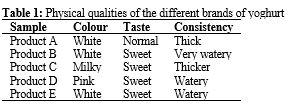Determination of Microbial and Physicochemical Qualities of Six Brands of Yoghurt Sold in Ogwashi-Uku Metropolis
DOI:
https://doi.org/10.54117/ijph.v1i3.8Keywords:
Yoghurt, microbial contamination, dairy products, BacillusAbstract
Yoghurt is a fermented dairy product, rich in protein content and possesses a gel-like texture. This study was undertaken to assess consumer preferences for yoghurt and to compare the nutritional, sensory, microbial and physiochemical qualities of six brands of yoghurt. The sensory analysis for color, taste and consistency were carried out, and it was observed that product A has a normal taste, while product B - E possesses a sweet taste, while product F has a sour taste, possessing a custard-like consistency. The total cultural heterotrophic bacterial and fungal count was observed, and product D possess a higher bacteria count, while product A possess a higher fungal count (Cfu/mL). A sensitivity culture test was carried out on five different bacteria isolate using the following antibiotics agents: Amoxicillin (AMI), Streptomycin (S), Chloramphenicol (CH), Norfloxacin (N), ciprofloxacin (CPX), Erythromycin (E), Gentamycin (CN), Rifampicin (RD), Ampiclox (APX), and Levofloxacin (Lev). The result showed that Bacillus coagulans was resistance to all the antibiotics. The result of this study further indicated poor microbiological standards of commercial yoghurts sold in Ogwashi-uku market in Delta state at the time of this research. It is recommended that yoghurt stored without a refrigerator over one day should be consumed to avoid an outbreak of contamination which can be called food poisoning. Also, manufacturers should apply hygienic processes when producing yoghurt to avoid contamination. Finally, yoghurt manufacturers and vendors should avoid long exposure of yoghurt, also quality control (QC) measures including good manufacturing practices (GMPS) should be encouraged.

Downloads
Published
How to Cite
Issue
Section
License
Copyright (c) 2022 T. O. Oni, Destiny C. Edward, Victor O. Iloh, Chiweike Dokubo

This work is licensed under a Creative Commons Attribution 4.0 International License.
